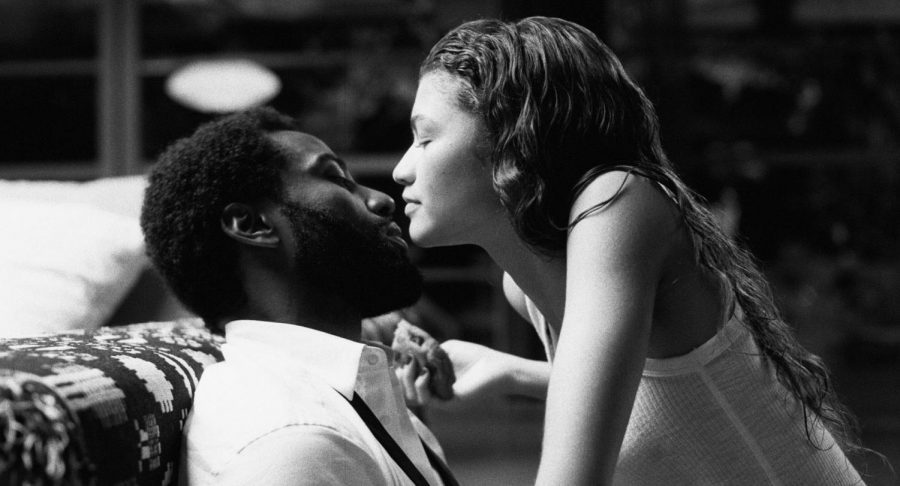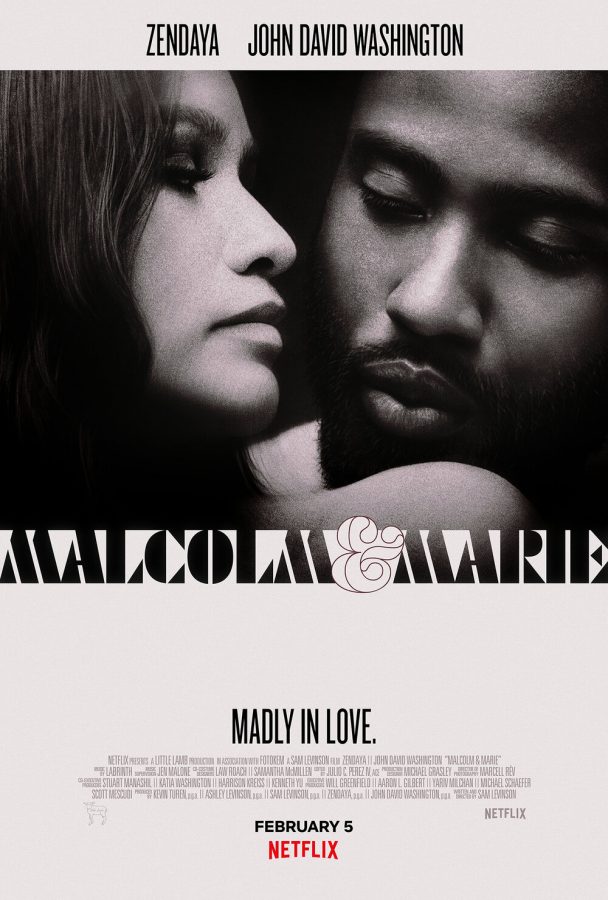Unproductive criticism film review: Malcolm and Marie
Netflix celebrates Valentine’s Day with a visceral depiction of abuse Content Warning: Mentions of psychological abuse
February 17, 2021
The decomposition of any once-promising relationship is an experience that leaves the participants with conflicting yet complex feelings, and “Malcolm and Marie” is no different. Sam Levinson’s (creator of Euphoria) take on a verbally abusive relationship offers an authentic window view into a calamitous bond between John David Washington’s Malcolm and Zendaya’s Marie. Initially, the caustic exchange is a powerful representation of a relationship where “unhealthy” as a description would be an understatement. The lovers accost each other with lacerating words. They belittle each other. They gaslight. They attack insecurities. They are equally cruel. This demonstration of pervasive harm in relationships is as fascinating and intriguing as it is distressing. But, like a decaying relationship, the early stages of infatuation are the superficial layer that does not last. At a certain point in “Malcolm and Marie,” it becomes apparent that the entirety of the film’s substance is in the couple’s bickering. Once the film’s value withers, the viewer is in the same position as the film’s titular characters wondering why they are staying.
If there is anything to take away from the one hour and forty-six-minute diatribe, it is that Sam Levinson’s poignant criticism of toxicity in relationships lays considerable groundwork for conversation. There really are no sides to be taken in the characters’ dissonance because their irrevocable verbiage functions as a highlight to the complexity of an abrasive relationship rather than to question who’s right and who’s wrong. This is what the film is most successful at. There is never a point where the viewer is told what to think or how to feel because its purpose is solely to evoke a genuine reaction to a common problem in relationships. Because the film refuses to pander, the audience is forced to make their own assessment of the situation and introspectively discuss the film’s themes. The movie is quite simply a fight that the viewer is thrust into. As Malcolm exclaims, “Cinema doesn’t need to have a [obscenity] message. It needs to have a heart and electricity.”

John David Washington’s “Malcolm” and Zendaya’s “Marie” portray a complicated romance, fraught with mutual psychological abuse.
While I think Malcolm is right, he is calling attention to the film’s overwhelming flaw. A film does not need to have a message or a narrative, it is purely a medium of expression, arguably the highest form, so there is no checklist or uniform to abide by. That said, expression can lack depth and is not safe from criticism. As engrossing as it is to witness such an accurate imitation of something, the act gets stale. Malcolm’s explosive lambasts are entertaining, Marie’s palpable pain is effectively harrowing and the display is life-like, but there is substance fleeting every second the audience begins to realize those are the only tricks this pony has. The film offers a conversation, but it is not participating in it.
The performances in this film are irrefutably what carries it. Washington fully shows his potential in the craft with his constant control of voice and impressive ability to recite long-winded rants, and Zendaya is captivating as she showcases her range. Together they create an interaction so real that you forget you are watching actors. To Levinson’s credit, the pair are working with a script that allows them to exhibit their skill. The verbose back in forth is almost musical regardless of whether or not it is meaningful. If it weren’t for Marcell Rev’s gorgeous cinematography, I would say Levinson’s lyrical prose is better suited for theater. The choice of Black & White encapsulates the film’s simplicity and accentuates the dialogue as the focal aspect of the movie. Despite the film’s lack of substance and weaknesses in social longevity, “Malcolm and Marie” is not short of some success. The accurate portrayal of abuse is excruciating to watch and the nuanced performances elevate that authenticity.





